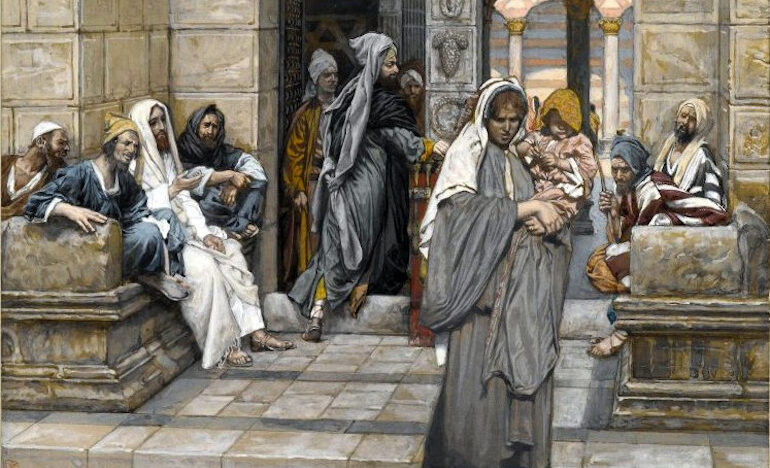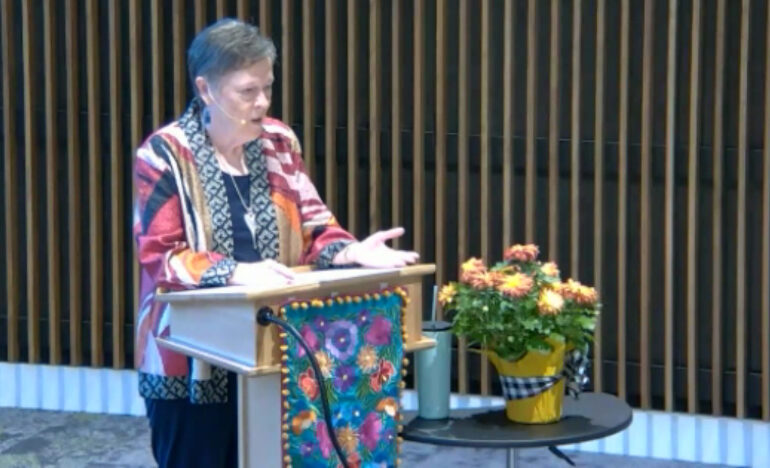Passing Like a Camel Through the Eye of a Needle: Wealth in the Teachings of Jesus and Buddha

By Kathy Keary
Part 8. Read all the parts of the Jesus and Buddha series here.
During the Christian season of Lent, our series exploring the teachings of two contemplatives, Jesus and Buddha, will continue with a focus on Lenten themes. Each year Lent serves as an invitation to detach from worldly goods opting for a lasting treasure found only in the divine. Our focus today will be on the Buddhist and Christian teachings on the topic of materialism.
In his book, Jesus and Buddha: The Parallel Sayings, Marcus Borg, a professor and Anglican New Testament scholar, contrasts the economic background of these two historical figures. Born to a peasant family in Galilee, Jesus attracted fisherman and farmers to his fold. On the other hand, Buddha, a prince and son of a prominent ruler, was born in India. His followers were not only the elite but also ordinary people and outcasts.
Note: Never miss an article published on the Renewal Center website: Sign up to receive our newsletters
Even though their backgrounds are strikingly different, they arrived at the same moral conclusion regarding materialism. Both considered wealth a deterrent to righteous living. Buddha spoke of the necessity to detach one’s self from possessions as a prerequisite to attaining nirvana. Borg summarizes Jesus’ position:
For Jesus, personal enrichment was found in heaven rather than in the marketplaces of the world. He not only would have agreed with Buddha’s teaching but would also have marveled at the fact that this rich man of royal ancestry had been able to pass like a camel through the eye of a needle.
Borg lists many examples of teachings on this topic where Buddha and Jesus mirror one another. We share a handful to highlight two profound leaders, though raised in starkly different situations, were inspired to sing the same song.
- Jesus: “No slave can serve two masters; for a slave will either hate the one and love the other, or be devoted to the one and despise the other. You cannot serve God and wealth” (Lk 16:13).
- Buddha: “One is the way to gain, the other is the way to nirvana; knowing this fact, students of Buddha should not take pleasure in being honored, but should practice detachment” (Dhammapada 5:16).
- Jesus: “How hard it will be for those who have wealth to enter the kingdom of God! It is easier for a camel to go through the eye of a needle than for someone who is rich to enter the kingdom of God” (Mark 10:23, 25).
- Buddha: “Riches make most people greedy, and so are like caravans lurching down the road to perdition. Any possession that increases the sin of selfishness or does nothing to confirm one’s wish to renounce what one has is nothing but a drawback in disguise” (Jatakamala 5.5, 15).
- Jesus: “If you wish to be perfect, go, sell your possessions, and give the money to the poor, and you will have treasure in heaven” (Matthew 19:21).
- Buddha: “The avaricious do not go to heaven, the foolish do not extol charity. The wise one, however, rejoicing in charity, becomes thereby happy in the beyond” (Dhammapada 13.11).
- Jesus: “He looked up and saw rich people putting their gifts into the treasure; he also saw a poor widow put in two small copper coins. He said, ‘Truly I tell you, this poor widow has put in more than all of them; for all of them have contributed out of their abundance, but she out of her poverty has put in all she had to live on’” (Luke 21:1-4).
- Buddha: “Giving is the noble expression of the benevolence of the mighty. Even dust, given in childish innocence, is a good gift. No gift that is given in good faith to a worthy recipient can be called small, its effect is so great” (Jatakamala 3:23).
Our God is a God of abundance yet 689 million people in the world find themselves in extreme poverty living on $1.90 or less per day. Nearly one in four households in the United States experienced food insecurity in 2020. Every year more than two million children face homelessness in the United States. These statistics are heart-wrenching and avoidable.
New articles in this series are posted to the website every Monday. The full series can be found here: An Invitation to Something New: The Contemplative Life. On Thursday’s we’ll send an email to remind you of the articles.
Our God of abundance depends on us to even the playing field by not only sharing our wealth with the “least among us” but also walking with those on the margins and standing up for the voiceless through our vote and legislative advocacy.
The poor are our concern. The need is dire. Today, let us join the crusade to end poverty in our world. This is the message of Jesus and Buddha. They could not be clearer. We are all called to do our part by sharing the gifts that we have so generously been entrusted.
Reference
Borg, Marcus. Jesus and Buddha: The Parallel Sayings. Berkley, California: Ulysses Press, 2004.
[Kathy Keary, a Precious Blood Companion and spiritual director, holds a master’s degree in theological studies and is a graduate of the Atchison Benedictine’s Sophia Center’s Souljourners Program, an intense study of spirituality and spiritual direction. Kathy believes that the divine is present and active in all of life and encourages others to be awakened to the God in all including the divine within. She enjoys accompanying others on their journey to wholeness discovering the person they were created to be.]
Image above “The Widow’s Mite” by James Tissot in the Brooklyn Museum, 2008, 00.159.211_PS2.jpg, Public Domain
We’d Like to Hear From You!
We’d like to know what you think about this article. Send us a comment using the form below. Do you have a suggestion? Is there something you want to learn more about? Send us a note.
Related

Discover Lectio Divina
Presented by Kathy Keary
This is a recording of “Discover Lectio Divina” presented by Kathy Keary at Precious Blood Renewal Center in Liberty, Missouri, on Oct. 2, 2025.

Do You Hear What I Hear?
By Fr. Garry Richmeier, C.PP.S.
How can we avoid the harmful affects of the polarization that characterizes so much of our lives these days? One step toward this end is to cultivate a greater understanding and appreciation for the idea of relativity in human behavior.
Categories
Assembling God's Puzzle Coffee with Padre Cooking & Spirituality Encounters of the 4th Kind Family Matters Guided Meditations Reflections on the Eucharsitic Prayers Spiritual Resources Taize Prayers Teach Us to Pray The Contemplative Life Traveling with Pilgrims of Hope Uncategorized Videos Week of Prayer for Christian Unity When you need a little help
